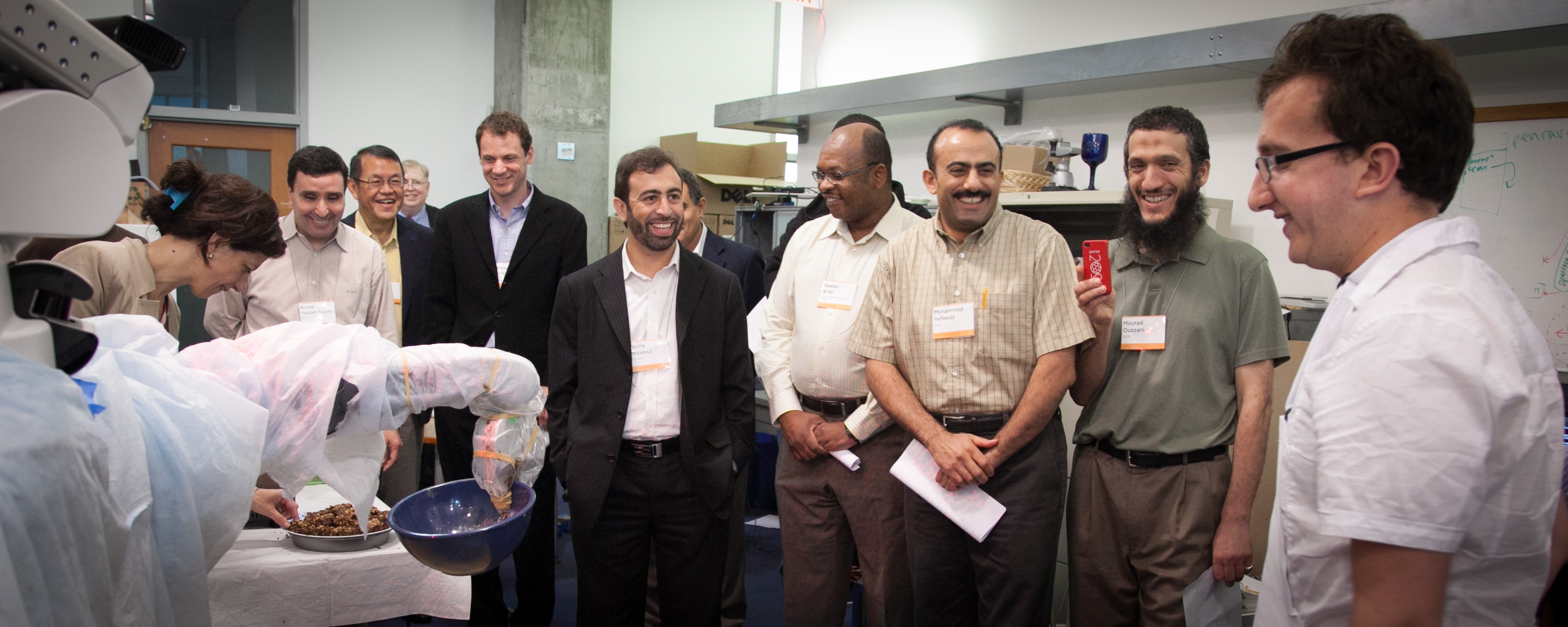CSAIL has eagerly engaged in collaborative research partnerships with government agencies and leading technology companies for more than fifty years. These partnerships benefit from shared goals and resources, and have resulted in significant technological advances and innovative new solutions.
CSAIL research is sponsored by a large number of diverse sources, from US government contracts to the private sector. United States government agencies include the Defense Advanced Research Projects Agency, the Department of the Air Force, NASA, the National Institutes of Health, the National Science Foundation and others. US and international non-federal sponsors include Boeing, Intel, Lockheed Martin, NTT, Qatar Computing Research Institute, Quanta, SAP, Shell, Toyota and many others. Other organizations sponsoring research include Delta Electronics Foundation, DSO National Laboratories, Epoch Foundation, Hong Kong Jockey Club, IBM, Pfizer Inc., the Singapore-MIT Alliance among others.
——Josephine Chao, president of the Epoch Foundation
Some current partnerships include:
-
DAF-MIT Artificial Intelligence Accelerator The Department of the Air Force (DAF) and MIT signed a cooperative agreement to jointly create an Artificial Intelligence Accelerator hosted at MIT. The effort, known as the DAF-MIT AI Accelerator, leverages the combined expertise and resources of MIT and the Department of the Air Force. The AI Accelerator conducts fundamental research to enable rapid prototyping, scaling, and the ethical application of AI algorithms and systems to advance both the Department of the Air Force and society in general.
-
Defense Science and Technology Office, Singapore In collaboration with the DSTA Singapore, we are developing solutions to fake news and advancing robots and reliable machine learning.
-
Microsoft - CSAIL Trustworthy AI Research Collaboration The mission of the CSAIL-MSR Trustworthy AI Collaboration (TRAC) is to extend understanding and to develop methods and tools for fielding AI technologies that are robust, secure, reliable, understandable and safe to deploy. Topics addressed by this program include (1) robust machine learning (ML) with an emphasis on development of training techniques that are able to deliver ML models that are more resistant to input perturbations and distribution shift, (2) machine learning for security, with an emphasis on addressing the security aspects of ML system deployment and applying ML methods to traditional computer security problems, (3) understanding and resisting ML attacks, with an emphasis on addressing the safety, security and privacy challenges that arise in the context of ML systems deployed on edge devices, (4) human - ML collaboration for enabling human-ML teaming, (5) reliable reinforcement learning that delivers policies with reliability guarantees, (6) ML for healthcare, and (7) policy perspective on ML.
-
The Qatar Computing Research Institute (QCRI)-CSAIL research collaboration is a medium for knowledge joint-creation, transfer, and exchange of expertise between MIT-CSAIL and QCRI scientists. Scientists from both organizations are undertaking a variety of core computer science research projects—Arabic speech and language processing, content-adaptive video re-targeting, database management, understanding health habits from social media pictures, understanding and developing for cultural identities across platforms, a vertically-integrated approach to resource-efficient shared computing, urban data analytics to improve mobility for growing cities in the context of mega events and accurate map making with mobile sensor data—with the goal of developing innovative solutions that can have a broad and meaningful impact.
-
Toyota-CSAIL Joint Research Center established a collaborative research center with CSAIL and Stanford in 2015 to further the development of autonomous vehicle technologies, with the goal of reducing traffic casualties and potentially even developing a vehicle incapable of getting into an accident.
-
Wistron, an original design manufacturing (ODM) company, collaborates with CSAIL to think about how we compute and communicate in the digital age to ensure that health and wellbeing are at the core of our lives, and our use of technology accelerates this objective.They have supported research ranging from new spreadsheet systems to better methods for analyzing CT-scans.
-
The World Wide Web Consortium (W3C) has its US headquarters at CSAIL. W3C develops, tests and approves new technological standards for the Web. Almost 500 companies serve as members of W3C who help the organization achieve its mission.
—- Steve Heller, former director of Quanta Research Cambridge
Past research partnerships
- Project Qmulus was a collaboration with Quanta Computer that explored the development of an integrated virtual information environment enabling people to interface with their laptops, phones, televisions, cameras, and MP3 players from any universal device, anywhere in the world. (More info)
- Northrop Grumman Corporation, an industry leader in network operations and cybersecurity, worked with CSAIL to take on issues in cybersecurity, including supply-chain risk and securing critical infrastructure networks.
- Project Angstrom was a research collaboration with Freescale, Mercury Computer Systems and Lockheed Martin to design the next generation of computer systems built to handle the challenges of exascale computing. This DARPA-funded project also includes researchers from MIT’s Microsystems Technology Laboratories, Research Laboratory of Electronics, Microphotonics Center, and the University of Maryland.
- Project Oxygen was a lab-wide series of project focusing on developing network, software, perceptual, and user technology systems that truly serve people by being pervasive, adaptable, and intentional. Oxygen was sponsored by Acer, Delta Electronics, Hewlett-Packard, Nippon Telegraph and Telephone, Nokia Research Center, Philips Research, and DARPA.
- The "TCSC" partnership between MIT, Tsinghua University and The Chinese University of Hong Kong (CUHK) formed a virtual Theoretical Computer Science Center with the purpose of conducting collaborative research.
